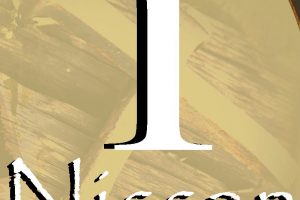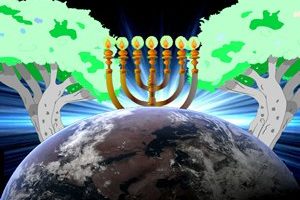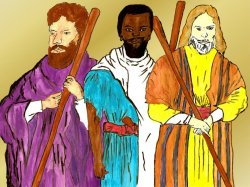Miracles during Passover season
Jesus, Yeshua, was given as a Passover offering from God to us.
On the 14th of Nissan, He was crucified, shed His blood, so that from that time onwards, this season of Passover will always bring a rememberance of victory to the evil forces against your life, every time and every year you keep this season of Passover.
Peter was delivered from prison by an angel in the season of Passover (unleavened bread), Acts 12:1-11.
The young boy offers his 5 loaves of bread (barley loaves)to the apostles, in this season of Passover, also this season, being the season of barley harvest (the season when Israel was supposed to give an offering from their barley harvest , Exodus 23:15).
When this boy offered his offering of barley, it became a miracle that fed 5000 men plus women and children, John 6:4-12.
After 40 years in the wilderness, before they conquered the land of their promise, they had to first keep the Passover,
I rather call it God’s way of pleading His blood over their lives as a sign of protection,
and from that time an angel was given unto them in the spirit to fight for them and to make them victorious towards their enemies as they possessed the land of their promise. Joshua 5:10-15.
Judges 6:19-27, Gideon turns from a fearful, low self-esteem, up to no good person, into a powerful man of faith, willing to fight God’s battle.
In this same season of Passover, God brought Gideon out from the place of being controlled by bad circumstances around him, into a place of being able to changethe bad circumstances by God’s power working through him.
Just because he remembered to honor God by bringing an offering to Him in this season of Passover (unleavened bread).
On the 3rd day following his circumcision at age 99, our Lord Jesus Christ, Yeshua, with 2 angels, visited Abraham; Raphael (Jehova Rapha, Yeshua) healed him on that same day, He also informed Abraham and Sarah that, in exactly one year, a son will be born to them.
Jesus, Yeshua stayed with Abraham as Abraham interceeded for Sodom and Gomorrah while the other two angels proceeded to Sodom to destroy the wicked city, Genesis 18:1-23.
God remembered Sarah as He had said; and God did to Sarah as He had spoken.
And Sarah conceived, and bore Abraham a son in his old age, at the set time of which God had spoken to him.
Abraham was a hundred years old, when his son Isaac was born to him. And Sarah declared: ‘God has made laughter for me, so that all that hear will laugh (‘yitzchak’) with me'” (Genesis 21:1-6).
And Jacob was left alone, and a man wrestled with him until the break of dawn. When he saw that he could not prevail against him, he touched the socket of his hip, and the socket of Jacob’s hip became dislocated as he wrestled with him.
And he (the angel) said, ‘Let me go, for dawn is breaking,’ but he (Jacob) said, ‘I will not let you go unless you have blessed me.’ So he said to him, ‘What is your name?’ and he said, ‘Jacob.’
And he said, ‘Your name shall be called no more Jacob, but Israel; for you have contended with God and with men, and have prevailed'” (Genesis 32:25-29).
It was the eve of Nissan 15. The next morning, Jacob confronted Esau in the flesh. Esau, who had come with a band of armed men with the intention to kill his brother, “ran to meet him, and embraced him, and fell on his neck, and kissed him; and they wept”.
Esau invited Jacob to join him in his mountain kingdom of Se’ir, but Jacob replied, “Please, let my lord go on ahead before his servant; and I will lead on slowly, according to the pace of the cattle that goes before me and the children, until I come to my lord to Se’ir” — a promise yet to be fulfilled (Genesis, 33:4-14).
On the 15th of Nissan — exactly one year before the Exodus — Moses was shepherding the flocks of his father-in-law, Jethro, at the foot of Mount Sinai, when God appeared to him in a “thornbush that burned with fire, but was not consumed” and instructed him to return to Egypt, come before Pharaoh, and demand in the name of God: “Let My people go, so that they may serve Me.”
For seven days and seven nights Moses argued with God, pleading that he is the wrong person for the job, before accepting the mission to redeem the people of Israel and bring them to Sinai.
At the stroke of midnight of Nissan 15, 210 years after Jacob settled in Egypt and 430 years after the “Covenant Between the Parts,” God visited the last of the ten plagues on the Egyptians, killing all their firstborn.
Earlier that evening, the Children of Israel offered a lamb and sprinkled the blood of the sacrifice on their doorposts as a sign that God will “pass over” their homes when inflicting the plague upon the Egyptians.
Pharaoh’s resistance to free them was broken, and he virtually chased his former slaves out of the land.
Several million souls–600,000 adult males, plus the woman and children, and a large “mixed multitude” of non-Hebrews who joined them — left Egypt on that day, and began the 50-day trek to Sinai and their birth as God’s chosen people.
Daniel was cast into a den of hungry lions by Darius I of Persia for violating a royal edict that no man may pray to any god save the king for 30 days.
Miraculously, the lions did not touch him, and he emerged from the den unscathed (Daniel 6:5-29).
On the 13th of Nissan, God appeared to Abram, changed his name to Abraham (“father of a multitude of nations”). Abraham was 99 years old at the time, and his son Ishmael, 13, Isaac, was born a year later.
In the 12th year of his reign (357 BCE), King Achashverosh of Persia endorsed Haman’s plan “to destroy, kill and annihilate all Jews, from young to old, infants and women, on a single day, on the 13th day of the 12th month, the month of Adar.”
On Nissan 13 (11 months before the date chosen for the massacre) proclamations of the decree were drafted and dispatched to all 127 countries of the Persian Empire. Mordechai told Esther to go before the king and plead for her people.
Esther asked that a three-day fast be proclaimed (Nissan 14, 15 and 16–including the first two days of Passover) in which all Jews would repent and pray for the success of her mission.
On the 3rd day of the fast proclaimed by Mordechai at her behest, Queen Esther appeared unsummoned before King Achashverosh–a capital offence.
The king, however, extended the royal sceptre to her, signifying his consent that she approach him. Esther requested that Achashverosh attend a private wine party with her and Haman.
At the 2nd wine party she made for King Achashverosh and Haman, Queen Esther revealed her identity to the king and began to plead for her people, pointing to Haman as the evil schemer plotting to destroy them.
When Charvonah, a royal servant, mentioned the gallows which Haman had prepared for Mordechai, the king ordered that Haman be hanged on them, opening the door for the Jews’ salvation from Haman’s decree (Book of Esther, chapter 7).
After seven days of contention with God at the burning bush, Moses assumed the mission of taking the Children of Israel out of Egypt.
Taking leave of his father-in-law, Jethro, he placed his wife and children on a donkey and set out for Egypt to demand of Pharaoh, “Let My people go!”.
Seven days after the Exodus, the Children of Israel found themselves trapped between the Egyptian army and cavalry pursuing them from behind and the waters of the Red Sea before them.
All that night, a pillar of fire intervened between the Egyptians and the Israelites; at daybreak, God commanded Moses: “Speak to the Children of Israel, that they should move forward!
” Moses lifted up the rod and stretched out his hand over the sea and the water split, and “the children of Israel walked across on the dry land in the midst of the sea”.
When the Egyptians followed, the waters returned to their natural state and place and drowned them. The Children of Israel sang the “Song at the Sea” in praise and gratitude to God.
The wicked cities of the Sodom valley, including Sodom, Gomorrah, Admah and Zevoim, were overtuned in punishment of their sins.
Only Lot, his wife and two daughters were saved. Lot’s wife, however, turned into a pillar of salt when she failed to heed the Divine warning not to look back at the burning cities.
When Lot was taken captive by the four kings who conquered the “five cities of the plain” (Sodom, Gomorra, Admah, Zevoim and Zoar), Abraham, aided only by a small band of loyal servants, went to battle to rescue his his nephew;
“the night divided for them, for him and his servants, and they defeated them, pursuing them to Hovah, which is to the left of Damascus…
And he recovered all the property; also his kinsman, Lot, and his property were recovered, and also the women and the people” (Genesis 14:15-16).
On the 15th of Nissan, God forged a special covenant with Abraham in which the destiny of the Jewish people was foretold: the Holy Land was bequeathed to them as their eternal heritage, but first they would have to experience galut–exile and persecution.
“And He said to Abram: ‘Know surely that your descendents shall be strangers in a land that is not theirs, and they will be enslaved to them, and they will afflict them four hundred years… and afterwards they shall come out with great wealth.
‘ And when the sun went down and it was dark, behold, a smoking furnace and a burning torch which passed between those pieces.







